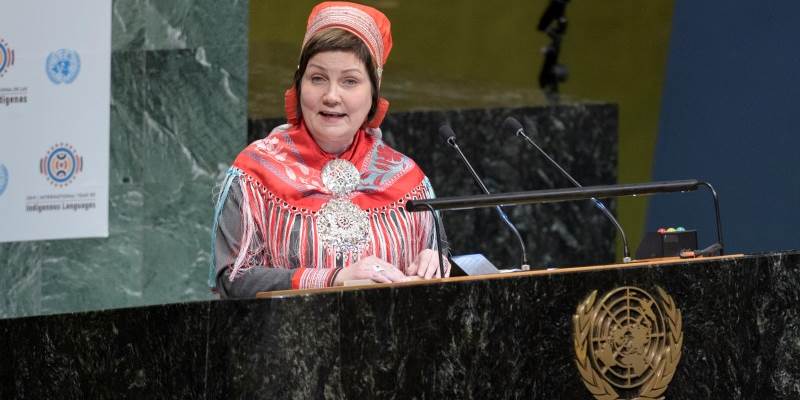Buorre beaivi, buvttán dearvuođaid Sámis dáid eatnamiid álbmogii. (Greeting in Sámi language)
I bring greetings from my homeland Sápmi to the people of this land, and I also honour this distingushed assembly with all its leaders and honourables, including my Indigenous brothers and sisters, and all caretakers of Indigenous languages.
I am truly pleased and gratified that the UN has designated a special International Year of Indigenous Languages. Article 13 of the United Nations Declaration on the Rights of Indigenous Peoples, decided on in this very hall, establishes that indigenous peoples are entitled to revive, use and develop our languages.
In the IYIL2019 Steering Committee, I represent the Indigenous Peoples of the Arctic Region. I also have the honour of co-chairing the Steering Committee, together with some very dedicated Indigenous and State representatives. Although we, the Indigenous peoples of the world, live under very diverse conditions, we share a history of colonialism, suppression of language, loss of culture and lands. However, we also share experiences of emancipation, of empowerment, of revival of language and culture.
There is a Sámi saying that describes this: Similar souls recognize each other. This year will offer us opportunities of sharing and inspiring each other to do better, to do more, for our languages.
Indigenous peoples are still experiencing formidable challenges related to using our languages in day-to-day life. Many of our elders have lost their native language, the language of their hearts. Many of our young ones have grown up without any opportunity to learn their own language. This is a painful truth, and it is the reason why language policy is so close to my heart. I think I share an ambition with many of you present here today. We will work hard to promote our languages so that they are seen as equal to the majority languages in the states we live in.
All languages have their own distinctive features and intrinsic value, and each language works equally well as a means of communication for those who use it. Between one-half and two-thirds of the people of the world are to some extent bilingual, and a significant number of them are multilingual. By global standards, this means that speaking several languages is a typical characteristic of being human. Like biological diversity, linguistic and cultural diversity are advantages in themselves, they are connected, and promotes creativity and innovation.
I speak to you as a Sámi woman, an Indigenous leader, and as a mother of three daughters. My greatest joy in life is to hear my daughters speak the language of our ancestors to each other, and I live in the hope of someday hearing my grandchildren speak in Sámi.
Why is this important? Our mothers tongues are not simply a question of communication; they are closely intertwined with identity, cultural heritage and sense of belonging to something greater. Our languages are like sinews that ties us to our heritage and our ancestors, they might tear, but can be mended, with care, with love, and with lots of hard work.
For this dream to come true, I believe the languages of our ancestors also have to become languages of a world of communication through technology. We are facing a digital leap. Do not leave our languages behind; let us also use this year to start closing the digital gap between the major languages and Indigenous languages.
My hope is that this year will help enhance the visibility and recognition of indigenous languages the world over. I also hope this year will give us the strength and energy we need to continue our valiant efforts to preserve our languages.
I would like to conclude by sharing with you a few words of the language of my heart, a quote from one of our elders. The late Sámi educator Per Fokstad described language like this:
Giella lea váimmu dulka, sielu govva. (quote in Sámi language)
Language is the interpreter of the heart, the mirror of the soul.
Ollu giitu. Thank you.
